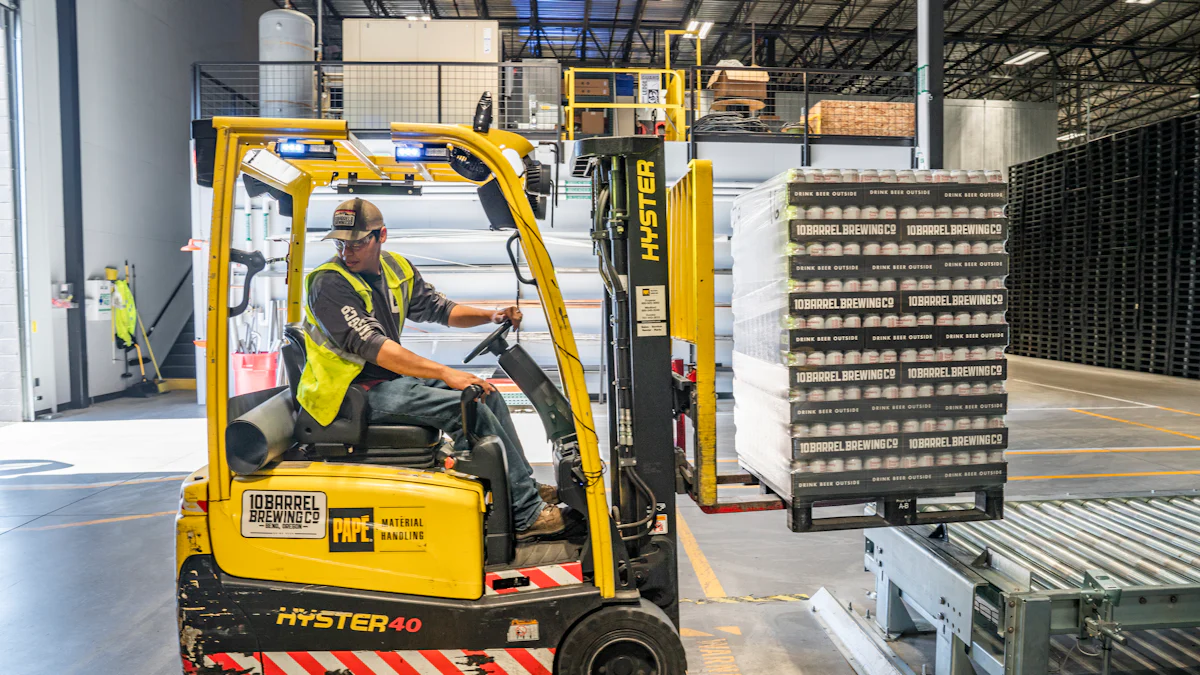
Pallet truck certification is a vital aspect of workplace safety and compliance. Ensuring that operators are properly trained and certified can significantly reduce the risk of accidents. This blog will delve into the significance of pallet truck certification, covering its definition, importance in maintaining a safe work environment, and the specific topics that certification courses typically include.
Understanding Pallet Truck Certification
Pallet Truck Certification ensures that operators are equipped with the necessary skills to operate pallet trucks safely and efficiently. By obtaining certification, individuals demonstrate their competence in handling these essential warehouse tools.
What is Pallet Truck Certification?
Definition and Purpose
Certification for pallet trucks involves formal training programs that educate operators on the proper use of pallet jacks. The purpose is to enhance workplace safety by reducing the risk of accidents caused by improper handling.
Importance in the Workplace
In a warehouse setting, where efficiency and safety are paramount, pallet truck certification plays a crucial role. Certified operators can navigate through busy environments with precision, minimizing disruptions and ensuring smooth operations.
OSHA Requirements
Need for Certification
OSHA mandates that all electric pallet jack operators must undergo formal training and certification to ensure safe practices in the workplace. This requirement aims to prevent accidents and injuries related to pallet truck operations.
Specific OSHA Standards
According to OSHA Standard 1910.178, employees operating motorized pallet jacks must be certified through approved training programs. Compliance with these standards is essential for maintaining a secure work environment.
Components of the Certification Process

Formal Instruction
Certified Trainer at Catalyst Paper Corp., Brooks, emphasizes the significance of formal instruction in the pallet truck certification process. Here are the key aspects:
Classroom Training
- Brooks highlights that classroom training provides a structured learning environment where operators can grasp theoretical concepts effectively.
- In-class sessions cover essential topics such as safety protocols, operational procedures, and equipment maintenance.
Online Training Options
- According to Brooks, online training offers flexibility for individuals seeking certification without compromising on quality.
- Online modules typically include interactive presentations, quizzes, and assessments to ensure comprehensive learning.
Practical Training
Brooks commends practical training as a crucial component of pallet truck certification. Here’s why it’s essential:
Hands-on Practice
- Practical sessions allow operators to apply theoretical knowledge in real-world scenarios under the guidance of experienced instructors.
- Hands-on practice enhances operators’ skills in maneuvering pallet jacks efficiently and safely.
Supervised Training Sessions
- Brooks suggests that supervised training sessions provide a supportive environment for operators to refine their handling techniques.
- Continuous feedback from trainers during supervised sessions helps operators improve their performance.
Performance Evaluation
When discussing the certification process, Brooks underscores the importance of performance evaluation. Here’s how it ensures operator competence:
Assessment Criteria
- Evaluations are based on predefined criteria that assess operators’ understanding of pallet truck operations and safety measures.
- By meeting assessment criteria, operators demonstrate their ability to operate pallet jacks proficiently.
Evaluation Methods
- Various evaluation methods, including written tests and practical demonstrations, are used to gauge operators’ competency levels.
- Brooks recommends a comprehensive evaluation process to validate operators’ skills and knowledge effectively.
Topics Covered in Certification
When delving into pallet truck certification, operators must understand the various types of pallet jacks and the operating procedures involved. Additionally, a strong emphasis on safety practices is crucial to ensure a secure work environment.
Types of Pallet Jacks
Electric Pallet Jacks
- Electric Pallet Jacks are essential tools in warehouse operations, requiring formal training and certification for safe operation.
- These jacks are powered by electricity, offering efficiency and ease of use for operators.
- Operators must be well-versed in handling electric pallet jacks to prevent accidents and ensure workplace safety.
Manual Pallet Jacks
- Unlike electric pallet jacks, Manual Pallet Jacks do not fall under OSHA’s requirement for formal certification.
- However, training on safe usage is still recommended to minimize risks and enhance operational efficiency.
- Manual pallet jacks are manually operated tools used for transporting goods within warehouses or distribution centers.
Operating Procedures
Basic Operation
- Understanding the Basic Operation of pallet jacks is fundamental for all operators.
- This includes learning how to maneuver the equipment safely, load and unload goods efficiently, and navigate through different warehouse environments.
- Basic operational knowledge ensures smooth workflow and minimizes disruptions during daily tasks.
Advanced Techniques
- Advanced Techniques in pallet jack operation involve mastering complex maneuvers and handling heavier loads.
- Operators trained in advanced techniques can optimize their productivity while maintaining safety standards.
- Continuous practice and skill development are key to mastering advanced pallet jack operations.
Safety Practices
Common Hazards
- Recognizing Common Hazards associated with pallet jack operations is crucial for accident prevention.
- Hazards such as collisions, tip-overs, or improper loading can pose risks to both operators and other warehouse personnel.
- By identifying common hazards, operators can take proactive measures to mitigate risks effectively.
Safety Protocols
- Adhering to Safety Protocols is paramount in ensuring a secure work environment when using pallet jacks.
- Protocols include wearing appropriate personal protective equipment (PPE), following designated traffic lanes, and reporting any equipment malfunctions promptly.
- Strict compliance with safety protocols minimizes accidents and promotes a culture of safety within the workplace.
Preventive Maintenance
Routine Checks
- Conduct daily inspections of the pallet jack to ensure all components are functioning correctly.
- Check the wheels, forks, and hydraulic system for any signs of wear or damage.
- Verify that the emergency brake and lift mechanism operate smoothly without any issues.
Maintenance Schedules
- Establish a regular maintenance schedule to keep the pallet jack in optimal condition.
- Follow manufacturer guidelines for lubrication, adjustments, and part replacements.
- Document all maintenance activities to track the history of repairs and ensure compliance with safety standards.
Differences Between Electric and Manual Pallet Jacks

Certification Requirements
Electric Pallet Jacks
- Operators of Electric Pallet Jacks must undergo formal training and certification to ensure safe handling practices.
- Certification for electric pallet jacks is crucial in preventing workplace accidents and promoting operational efficiency.
- Training programs focus on the specific requirements for operating electric pallet jacks safely within warehouse environments.
Manual Pallet Jacks
- While certification is not mandatory for Manual Pallet Jacks, operators are encouraged to undergo training to enhance their skills.
- Proper training on manual pallet jacks can improve operational effectiveness and reduce the risk of accidents in the workplace.
- Understanding the nuances of manual pallet jack operation is essential for maintaining a secure work environment.
Operational Differences
Handling and Control
- The Handling and Control of electric pallet jacks differ significantly from manual counterparts due to their powered nature.
- Electric pallet jacks offer enhanced maneuverability and ease of operation compared to manual models, improving overall efficiency.
- Operators must be proficient in controlling electric pallet jacks to navigate through warehouse spaces effectively.
Maintenance Needs
- When considering Maintenance Needs, electric pallet jacks often require specialized servicing due to their complex components.
- Regular maintenance schedules are essential for ensuring the longevity and optimal performance of electric pallet jacks in daily operations.
- Proper maintenance procedures contribute to minimizing downtime and maximizing the lifespan of electric pallet jacks.
Availability and Duration of Certification Courses
Course Providers
- Various institutions offer pallet truck certification courses to equip operators with the necessary skills.
- Online courses provide flexibility for individuals seeking certification without compromising quality.
- In-person training sessions offer hands-on experience under the guidance of experienced instructors.
Duration of Courses
- Typical timeframes for certification courses range from 60 to 90 minutes, ensuring comprehensive learning.
- Intensive courses provide condensed training schedules for quick certification, while regular courses offer a more extended learning period.
- Highlight the significance of pallet truck certification in maintaining a safe work environment.
- Emphasize the critical role of certification in ensuring compliance with safety standards and regulations.
- Encourage all pallet truck operators to pursue certification for enhanced operational efficiency and workplace safety.
Company Information:
- OSHA Education Center: Provides online Pallet Jack Safety Training and Certification courses for both manual and electric pallet jacks. Certification is valid for three years.
- OSHA.com: Offers an OSHA-Compliant Training Class Online that satisfies OSHA’s requirements for operator safety training. Provides test access, certificates, and employer checklists.
- RC University: Offers fundamental information on motorized pallet truck safety for employees.
Post time: Jun-19-2024
